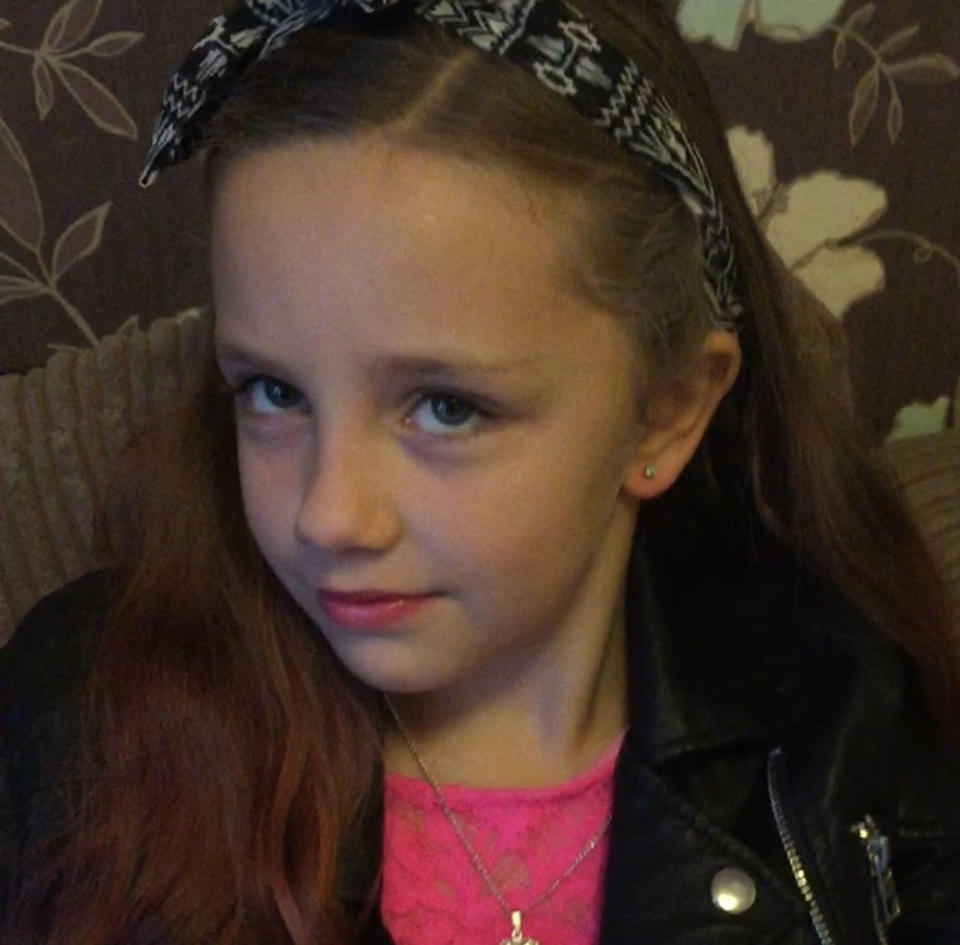Girl suffers burns to 65 per cent of body in reaction to pain medication
A girl has suffered burns to 65 per cent of her body and lost her memory from an allergic reaction to pain medication.
Alexa Juckiewicz-Caspell, 10, from Clacton-on-Sea, Essex, in southeast England, came down with Stevens-Johnson syndrome after taking a prescription to relieve her symptoms of the chronic pain condition Trigeminal Neuralgia.
Steven-Johnson syndrome is a severe skin reaction to medication or an infection.
After calming down the pain and twitches in her face, the medicine caused a reaction that led to rashes all over her body and left doctors believing she was going to die.

Alexa spent six weeks in the hospital and was put in a medically induced coma after the disease caused her eyes and mouth to become glued shut.
She began her first stages of recovery in April 2017, waking up with no memory of the past and re-learning how to do some of the simplest tasks including talking and breathing before returning home.
More than a year after leaving the hospital, Alexa is still slowly progressing.
The 10-year-old is working on adapting to being hearing-impaired, having to take her “safe” medications and continues to have trouble walking and swallowing food, having recently spent eight weeks in a wheelchair.
An amazing determination
Her mum, Kazmira, 36, said none of the doctors knew what Alexa had and she had to send photographs to other hospitals to get a proper diagnosis.
“She had to be kept in the burn unit as they scrubbed her body of the burned skin, shaved her head and wrapped her in foil,” she said.
“It took them two weeks to get her eyes open.
“I had no idea what Stevens-Johnson syndrome was and when she was first put in a coma, the doctor told me it was unlikely that she would survive the night. I was terrified.”

Ms Juckiewicz-Caspell said her daughter was covered in blisters and burns. The little girl also had to learn how to “breathe, walk, talk and eat all over again” but she’s amazed everyone with her determination.
“She’s still choking on a lot of her foods and sometimes her mouth even starts erupting in blisters again after a meal,” the mum said.
“We are blessed and we take each day as it comes. It is very hard, but we are strong.”
Alexa, aged eight at the time, started experiencing symptoms of Trigeminal Neuralgia in January 2017, but she was quickly diagnosed and prescribed a pain killer.

The medication quickly caused reactions, with the first symptom being blisters on random parts of her body.
“She had extreme burning pain from behind her ear, across her face and all the way down her neck. She explained that it felt like someone was cutting her face,” Ms Juckiewicz-Caspell said.
“She started getting rashes on her skin and we had no idea what was wrong.”
Doctors at a loss to explain condition
On a particular day that an even worse rash erupted on Alexa’s lips, her mum brought her to the hospital, where an EpiPen caused the reactions to worsen.
It was then that they realised it was something more than a regular allergy.
“One of the most difficult parts of dealing with this was that the doctors didn’t even know what she had,” the mum said.
“One of them even thought it was herpes.
“There needs to be much more awareness about this condition. If more doctors become familiar with it, they can prevent it.”

While Alexa is back in school, she is still unable to participate in certain activities and has to miss a lot of days to attend medical appointments.
Ms Juckiewicz-Caspell is hoping her daughter can make more progress in her recovery before starting primary school.
“The school does everything they can to help her,” she said.
“It’s very difficult for her to do the things she used to.
“She still gets weak, so it can be difficult for her to write or participate in physical activities with the other kids.”
While Ms Juckiewicz-Caspell still thinks about how the disease could have been prevented, she is grateful that Alexa is still alive.
The mum also feels that she has spread more awareness already, as Alexa’s doctors were able to spot Stevens-Johnson syndrome immediately in their next patient.
“I get angry at myself and the hospital sometimes, but then I stop myself because I’m lucky that she’s still here,” she said.
“A boy came into the hospital with the same condition right after Alexa and the doctors knew exactly what to do.”


